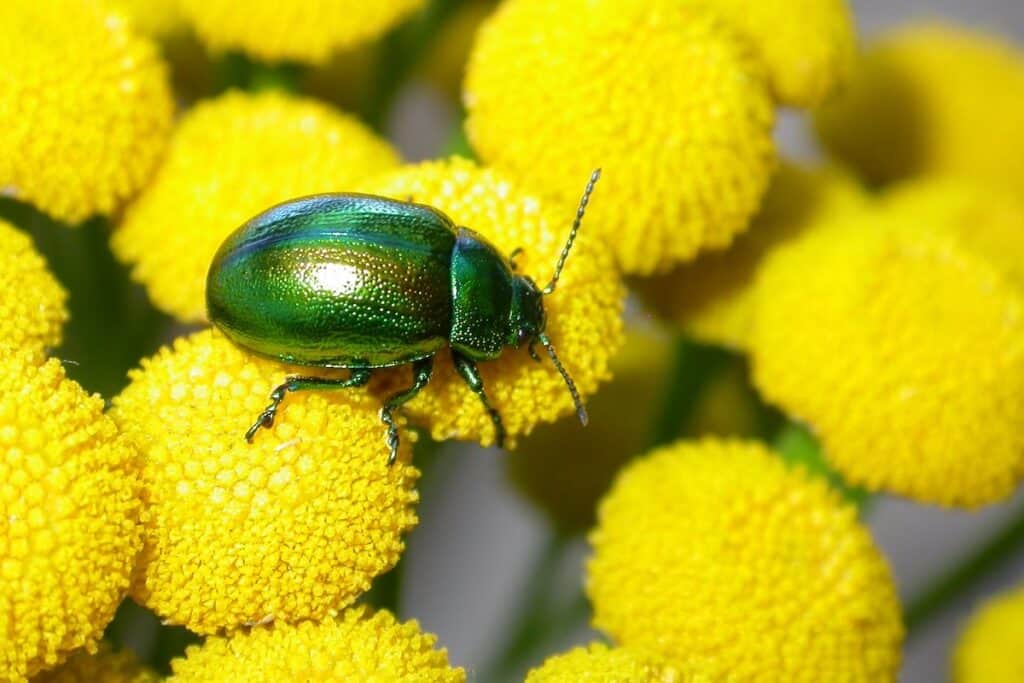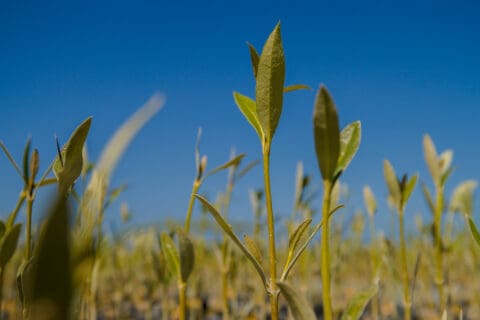
Populations of birds, bees and bugs are under pressure and threat worldwide, but a welcome piece of good conservation news out of Yorkshire tells the story of the remarkable resurgence of the most ‘bling’ beetle.
Once widespread in Britain, the Tansy Beetle is now officially Endangered in the UK. It is only found along the banks of a 45km stretch of the River Ouse around York, with much smaller populations in East Anglia.
This is no ordinary beetle, though. It has been hailed for its beauty since the days of the Victorians, who used its shiny wing cases as sequins. In recent years, it has been the subject of a York mural, by street artist ATM.
So, for over 10 years, local volunteers organised by the Tansy Beetle Action Group (TBAG) have been pacing the banks of the River Ouse, in Yorkshire, counting beetles one by one on clumps of Tansy – its foodplant.
Happily, 2023 proved to be a record year for the endangered Tansy Beetle (Chrysolina graminis).
The annual survey, carried out by volunteers, revealed a population estimate of 91,000 — nearly double the previous highest total of 46,000, recorded back in 2016.
Ongoing flood risk and threats of invasive species
The result came as huge surprise. Nobody could have predicted the surge in numbers of this striking iridescent green leaf beetle. One lucky (and hardworking) volunteer counted more than 20,000 beetles!
Conservationists have naturally welcomed the positive news and say it demonstrates the success of changes to the management of the riverbank. Working together with local landowners they have made sure that this essential Tansy foodplant is left growing to help the beetles complete their lifecycle.
However, despite the record numbers, there are still concerns about how the Tansy Beetle might cope with the increase in summer flooding events that are expected with climate change.
There is also the threat of Tansy being outcompeted by invasive plants, such as Himalayan Balsam.
Conservation remains critical, argues Vicky Wilkins, Programmes Manager at the Species Recovery Trust:
“It’s wonderful news to hear how well our Tansy Beetles fared in 2023! But it is only through the hard work of dedicated local volunteers over many years that we have been able to see the difference that better riverbank management has made. There is still a lot more to do, to secure the future of this stunning beetle.“
The survey does suggest, though, that work is paying off, says Karim Vahed, England Manager at Buglife:
“Against the backdrop of widespread insect declines, it is very welcome for there to be a success story. The improved fortunes of the Tansy Beetle show just how careful we need to be in caring for nature. Tansy is their main foodplant on the River Ouse, and if a clump is cut, the beetles have to walk to find the next patch as they are poor fliers.”
The efforts of the local community are also to be applauded and encouraged, adds Councillor Jenny Kent, Joint Executive Member for the Environment and Climate Emergency:
“A huge thank you to the dedication of York volunteers and supporters who have shown we can turn the tide of biodiversity loss. We encourage everyone to take heart from this and get involved.”
Importance of invertebrates to life on Earth
The Tansy Beetle Action Group (TBAG) was set up by Buglife to initiate and oversee conservation efforts aimed at saving the Tansy Beetle from extinction in Britain.
Working to a five-year conservation plan, TBAG comprises of representatives from 14 organisations including University of York, St Nicks and City of York Council.
Buglife is the only organisation in Europe devoted to the conservation of all invertebrates. Its aim is to halt the extinction of invertebrate species and to achieve sustainable populations of invertebrates.
Invertebrates are vitally important to a healthy planet — humans and other life forms could not survive without them. The food we eat, the fish we catch, the birds we see, the flowers we smell and the hum of life we hear, simply would not exist without bugs.
Invertebrates underpin life on Earth and without them the world’s ecosystems would collapse.
The Species Recovery Trust is a charity devoted to saving some of Britain’s most endangered species. There are over nine-hundred native species in the UK which are currently classed as under threat with several hundreds more known to be in significant decline.
The primary aim for the Trust is to remove 50 species from the edge of extinction in the UK by 2050.
Further Reading:
- More about Buglife; and the Tansy Beetle Action Group (TBAG);
- More about the work of the Species Recovery Trust;
- More about what it means to be an Endangered Species;
- Also on SustMeme, Biodiversity risk not on business radar;
- Also on SustMeme, Winners of the BIG Biodiversity Challenge Awards 2021;
- Also on SustMeme, Making waves in ocean and marine conservation.
Check out the full archive of stories under the SustMeme Biodiversity & Conservation topic.






